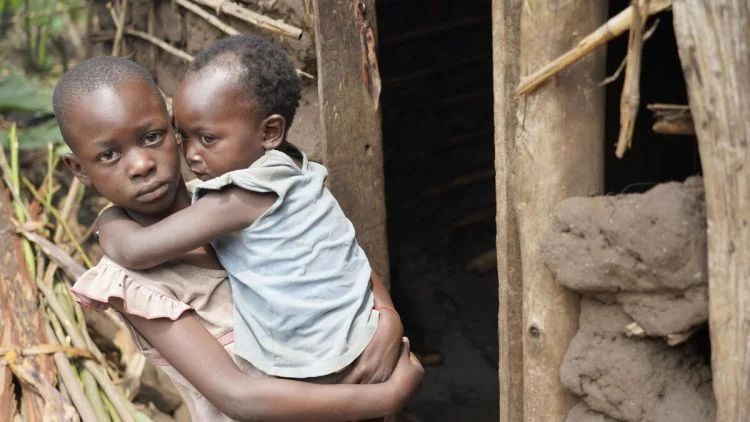A alarming new global analysis released today reveals a devastating reality: more than 400 million children worldwide are living in poverty, deprived of at least two daily essentials required for their basic survival, such as proper nutrition and sanitation.
The data serves as a stark warning that the fight to protect the world’s youngest citizens is faltering. As global funding dries up and climate instability rises, millions more are at risk of falling through the cracks.
The Scale of Deprivation
In low- and middle-income nations, the situation is particularly dire. More than 1 in 5 children—equating to roughly 417 million young lives are severely deprived in at least two critical areas necessary for their health and development.
The analysis measures poverty not just by income, but by “multidimensional” factors across six categories:
- Education
- Health
- Housing
- Nutrition
- Sanitation
- Water
The findings are grim: 118 million children are currently suffering from three or more of these deprivations simultaneously, while 17 million endure four or more.
Sub-Saharan Africa and South Asia Hardest Hit
The highest concentrations of this multidimensional poverty are found in Sub-Saharan Africa and South Asia. In Chad, for instance, the data shows that a staggering 64 percent of children face two or more severe deprivations, while nearly a quarter face three or more.
Among the specific categories, sanitation remains the most widespread failure.
- 65% of children in low-income countries lack access to a toilet.
- 26% in lower-middle-income countries face the same issue.
- 11% in upper-middle-income countries are affected.
This lack of adequate sanitation is a primary driver of disease, undermining physical health and long-term development.
Why Progress is Stalling
While there was a positive trend between 2013 and 2023—where the share of children facing severe deprivation dropped from 51 percent to 41 percent—that momentum is now being lost.
A “perfect storm” of compounding crises is reversing these gains. Conflict, environmental disasters, shifting demographics, and crippling national debts are squeezing government budgets. Furthermore, unprecedented cuts to international development assistance are threatening to deepen child deprivation across the developing world.
Current projections suggest that if these cuts continue, millions of children under the age of five could die from preventable causes by 2030, and millions more could be forced out of school by next year.
Wealthy Nations Are Not Immune
The report also sheds light on “monetary poverty” in high-income nations. Analysis of 37 wealthy countries shows that about 50 million children (23 percent of the child population in those areas) live in relative poverty. This means their households earn significantly less than the national average, limiting their ability to participate fully in society.
While some nations like Slovenia reduced poverty by over a quarter through strong minimum wage laws and family benefits, others have regressed. France, Switzerland, and the United Kingdom all saw child poverty rates increase by over 20 percent between 2013 and 2023.
A Roadmap for Hope
Despite the bleak outlook, the data proves that ending child poverty is possible with the right political will.
Tanzania serves as a beacon of success, achieving a 46-percentage point reduction in multidimensional child poverty over two decades. This was driven largely by government cash grants that empowered households to make their own financial decisions.
Similarly, Bangladesh saw a 32-percentage point drop, fueled by government initiatives that expanded electricity access, improved housing, and invested heavily in water and sanitation. Notably, open defecation in Bangladesh dropped from 17 percent in 2000 to zero in 2022.
The Way Forward
To turn the tide, the analysis outlines urgent steps for global governments:
- Make child poverty a national priority.
- Protect social spending: Integrate children’s needs into economic budgets.
- Direct Support: Provide cash support programs to struggling families.
- Essential Services: Expand access to healthcare, education, and water.
- Decent Work: Ensure parents have economic security, which directly benefits child well-being.
READ ALSO: President Hassan Names Loyal Ally Nchemba as New PM




















